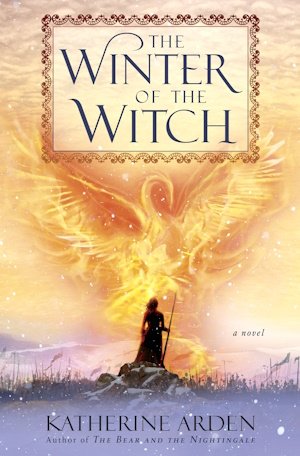“None at all?” Midnight looked amused.
“Misplaced longing was all there ever was,” Vasya insisted. “I do not love him.”
To that Midnight made no answer.
Vasya wished they could linger, for she began to get glimpses of things far off; of cities in festival, on high hilltops, where the shrieks of revelers by torchlight came clearly to her ears.
“There are farther, stranger countries,” said Midnight. “Places you would have to journey long in the dark to get to. Places that you might never be able to get to, for your soul could not comprehend them. Places that are not a part of your lifetime of midnights; they are from when your earliest ancestor was born, or when your furthest
grandchildren will die. Even I cannot get to all of them. By that I know that one day I will cease to exist, and not every midnight in the life of the world will know my hand.”
Vasya felt a little thrill, deep inside her. “I would like to see the far reaches of your country,” she said. “To feast in strange cities, break midnight bread in a bathhouse before a wedding, or see the moon on the sea.”
Midnight glanced sideways at her. “You are a strange girl, to want that danger. And you have much to do before you can think of journeying, in Midnight or anywhere.”
“And yet, I will think of the future,” Vasya retorted. “To remind me that the present is not forever. One day I may see my brother Alyosha again, and my sister Irina. I might have a home of my own, a place and a purpose, a victory. What is the present without the future?”
“I do not know,” said Midnight. “Immortals have no future: only now. It is our blessing and great curse.”
It was growing steadily colder. Vasya began to shiver. Big, frosty stars showed overhead; the sky was clear through the leafless trees.
Now her feet broke through deep snow with every step. Vasya began to stumble, dazed with tiredness. Only fear kept her awake.
Finally, Voron and Pozhar stopped. A slim creek, blue with ice, lay before them. Beyond that stood a small, palisaded village. It was a perfectly clear winter night. The stars lay overhead thickly as water slopped from a careless bucket.
The houses had holes for the smoke, not chimneys. The places under the eaves were carved but not painted, and the palisade was low and simple; designed to keep cows and children in, not marauders out. Strangest of all: there was no church. Vasya, in all her life , had never seen a community without a church; it was like seeing a person with no head. “Where are we?” she asked.
“The place you sought.”
16.
The Chains of the Winter-King
“MOROZKO IS HERE?” VASYA ASKED. “This is a prison for a frost-demon?”
“Yes,” said Midnight.
Vasya eyed the village. What here could keep the winter-king imprisoned? “The white mare—the swan—is she close?” she asked Pozhar.
The mare lifted her golden head. Yes, she said. But she is afraid.
She has been waiting for him a long time in the dark. I am going tofind her. She needs me.
“Very well,” said Vasya. She laid a hand on Pozhar’s neck. The mare didn’t even bite. “Thank you. When you see the white mare, tell her I am going to try and save him.”
Pozhar stamped. I will tell her. She wheeled and galloped away, skimming the snow and melting it, the cut on her leg almost mended already.
“Thank you,” said Vasya to Polunochnitsa.
“You are going to your death, Vasilisa Petrovna,” said Midnight.
But there was doubt now in her voice. Her black stallion arched his neck and blew softly; she scratched his withers, frowning.
“Even then,” said Vasya. “Thank you.” She began to make her painstaking way toward the village. She could feel Midnight watching her go. Just before she was out of earshot, Midnight called, as though she could not help it, “Go to the great house. But tell no one who you are.”
Vasya glanced back, nodded, and walked on.
She would have expected Morozko’s prison to look something like the Bear’s clearing. Or perhaps a locked and guarded tower and he confined, like a princess, at the top of it. At least, she would have expected it to be a summer place: one where he was faint, powerless.
But this was just a village. In winter. Gardens slept under snow; beasts drowsed in their warm stables. A single house in the very center streamed noise and light. Smoke poured from a hole in the roof. She could smell meat roasting.
How could Morozko be here?
Vasya climbed the palisade and crept toward the great house.
She was quite near when the fresh-fallen snow of its dooryard quivered and a chyert emerged. Vasya halted abruptly. It was the dvorovoi, the dooryard-guardian, and he was not tiny, like all the other dvoroviye she had ever known. He was as tall as she, his eyes fierce.
Vasya bowed, with wary respect.
“Stranger, what are you doing here?” he growled.
Her mouth and throat were dry, but she managed, “Grandfather, I am here for the feasting.” Not quite a lie. She was hungry; Ded Grib’s camp-rations seemed an age ago.
Silence. Then the dvorovoi said, “You have come a long way, only for the feasting.”
“I am also here for the winter-king,” she admitted, low. It was difficult to deceive a house-spirit, and unwise to try.
The dvorovoi’s eyes measured her. She held her breath. “Go through the door then,” he said simply, and vanished once more into the snow.

























